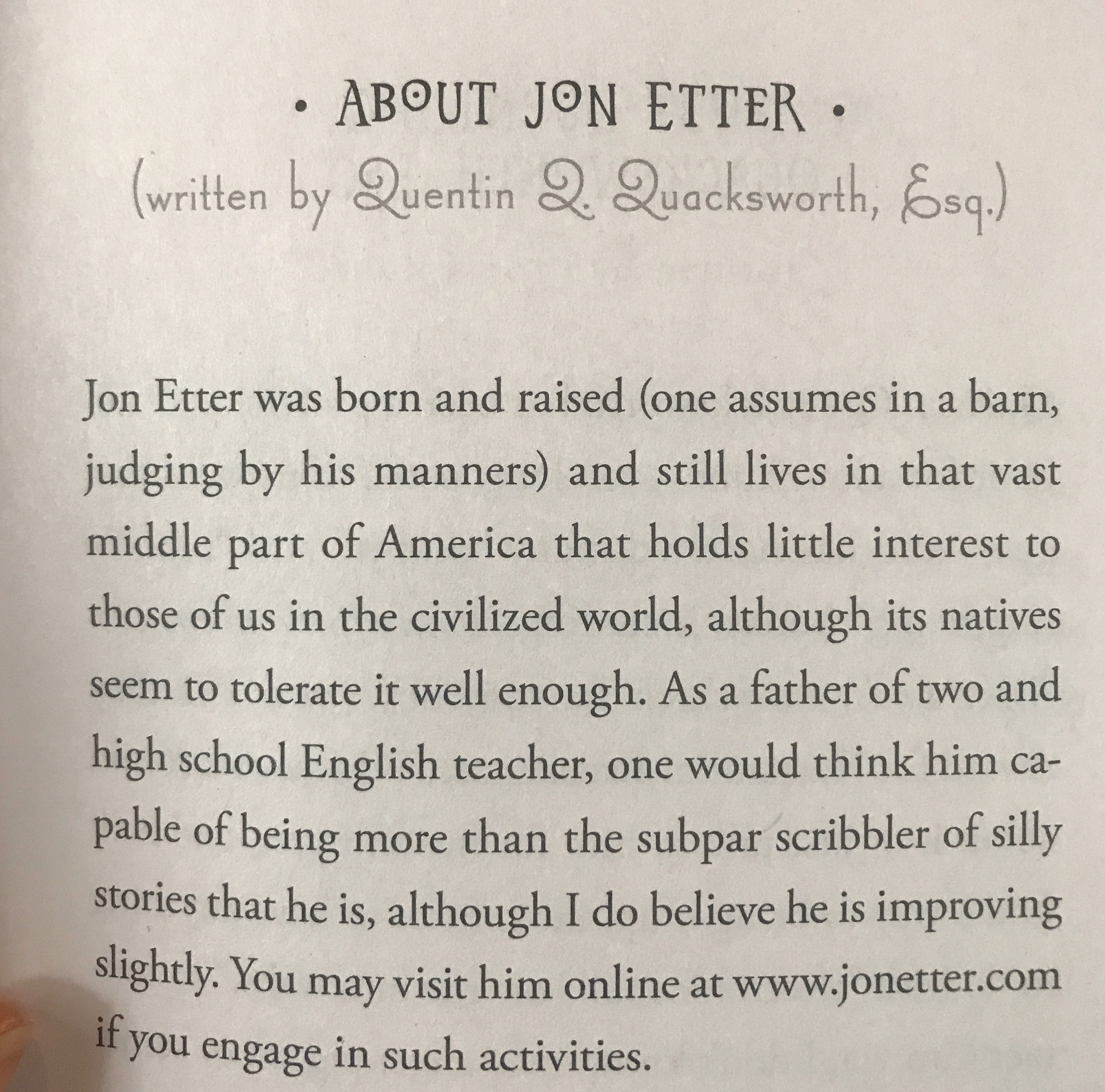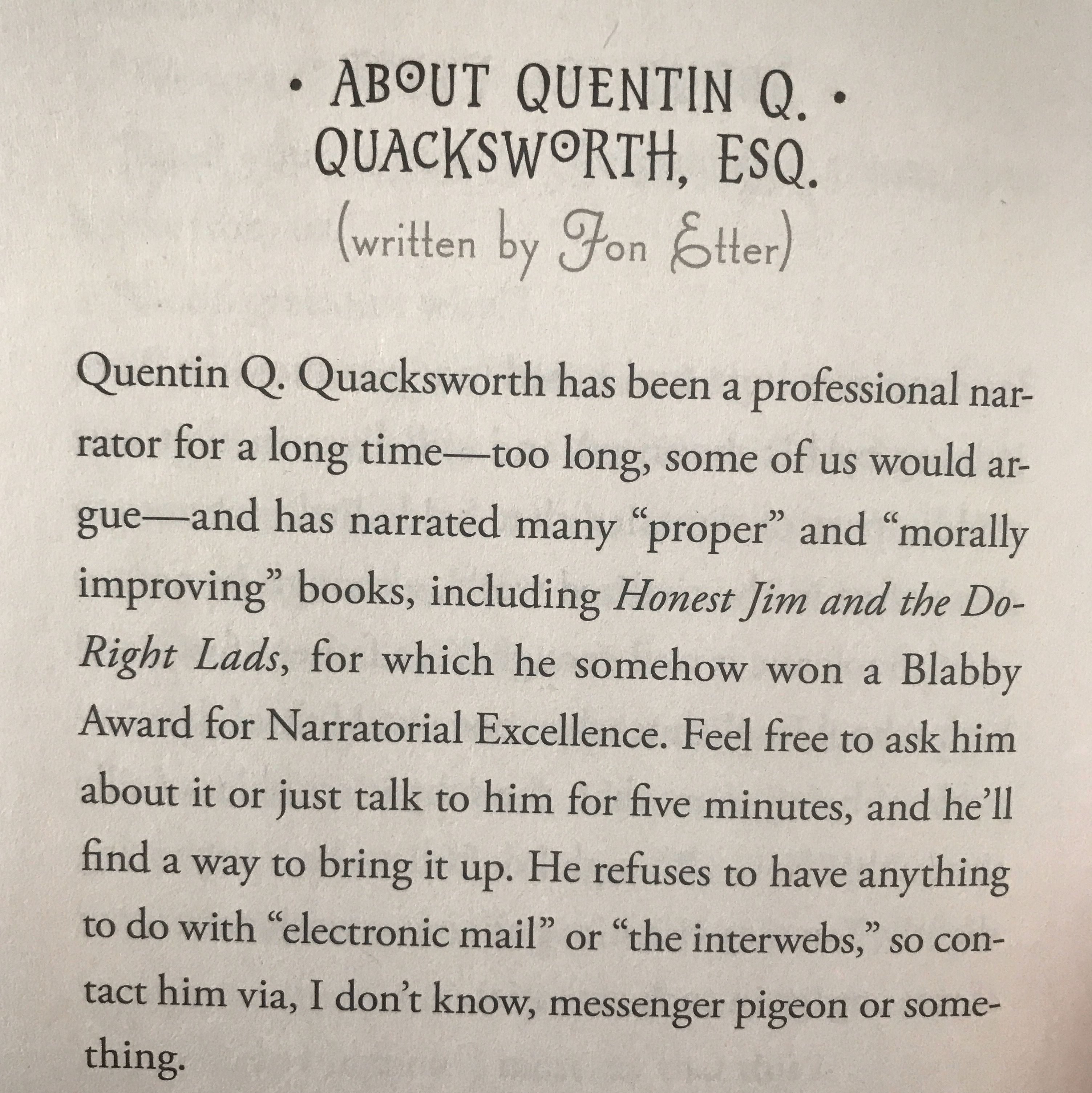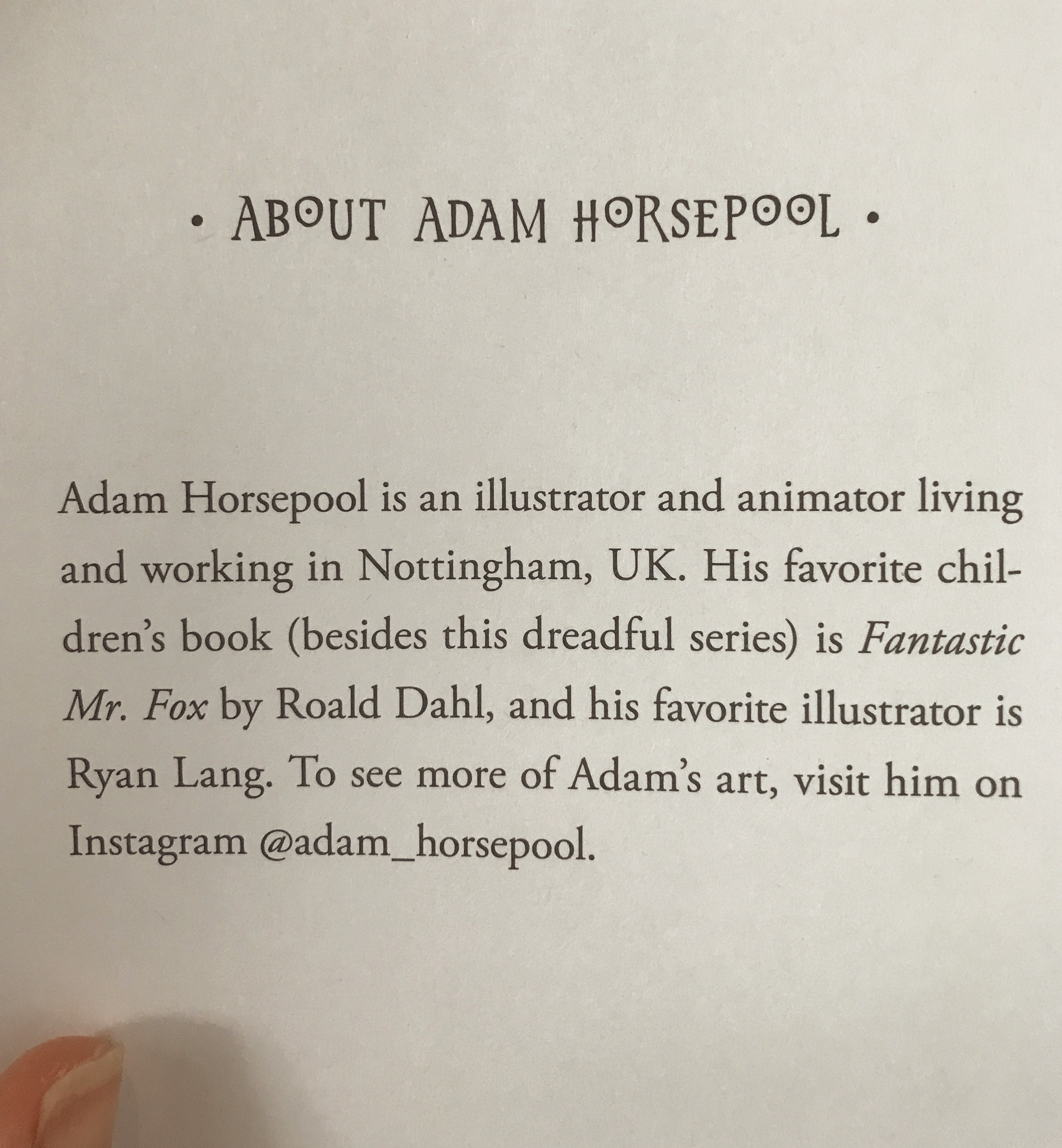Interview with Jon Etter, Author of Another Dreadful Fairy Book
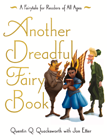
I discovered A Dreadful Fairy Book, the first book in this series, last year on Net Galley and was utterly captivated. Jon Etter's second book, Another Dreadful Fairy Book, releases next week with Chicago Review Press and is absolutely delightful. I have to admit I love it even more than the first, but I think that's more a reflection of my growing attachment to the characters after spending more time with them--much like how friendships deepen over time--rather than any criticism of the first book.
Another Dreadful Fairy Book brought me back to that space in childhood when the greatest joy of all was that surging happiness of finishing a book with a satisfying ending.
This sequel is filled with unexpected twists: who you think is evil isn't always evil. What you think will be terrifying isn't always scary. It reads as if the writing of it delighted Etter as much as it delighted me to read it. It is filled with amusing Easter Eggs, such as a librarian named Dewey who is in charge of organizing books, a library owned by a woman named Alexandria that burns down, or King Quillwyrm who pulled the butter knife out of the stale loaf of enchanted rye bread, thus proving his right to rule. Another Dreadful Fairy Book is a playful romp that still has some sneaky life lessons as well:
"Reading really is one of the best remedies for stupidity."
"You'd be surprised by how much power comes from knowing your history."
"Being in charge doesn't prove you're right."
I was particularly enchanted by the unicorn that was born without a horn. Some characters have trouble accepting that it is a unicorn and not a mule, but it knows exactly what it is even if its outsides don't match its insides, and by the end, everyone else can't help but see the truth. Perfect for readers of all ages, this funny and fast-paced book is a great choice for reluctant readers who become impatient with slower stories.
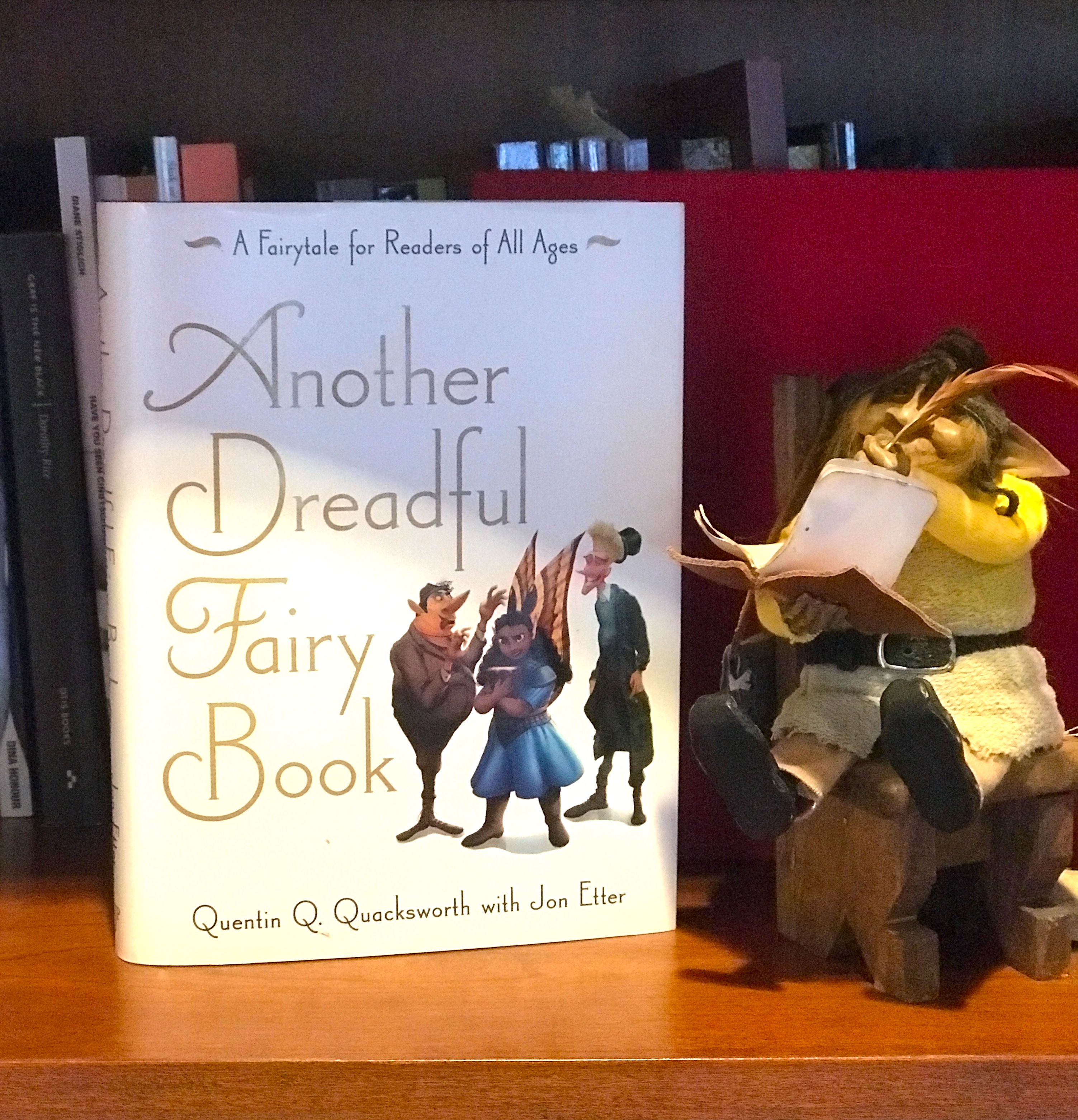
From Amazon:
The magical Grand Library of Elfame is in danger! The fearsome bugbear Norwell Drabbery, Grand Scrutinizer for the Ministry of Ordinariness, Averageness, and Normalcy (M.O.A.N.), wants to remove books he deems "damaging," and even threatens to close the library altogether. But the heroic junior librarian and bibliophile Shade won't let censorship and suspicion ruin her dream to instill a love of books into the community of Elfame. With her friends the fast-talking Ginch and the silent but resourceful Professor, she sets out in search of help from a secret society charged with saving rare books.
Book 2 of Those Dreadful Fairy Books and sequel to A Dreadful Fairy Book, winner of the 2019 Eric Hoffer Award for Middle Reader Book of the Year and First Horizon Award for Debut Book.
I follow Jon on Twitter and have enjoyed getting to know him through social media. I asked him if I could send some questions about the new book, writing, and life in general and he graciously agreed.
LL: You are a full-time high school teacher in Wisconsin. Do you think teachers have an edge in writing middle grade or young adult, since they are still immersed in the language of young people all day? Or does teaching sap your creativity and make you want to revolt and do anything but write for children?
JE: I think overall it does give us an edge. Most people, as they get older, seem to forget what it was like to be young—I always think of that line from e.e. cummings, “down they forgot as up they grew.” But when you work with kids, it keeps those memories fresh because you see them go through the same things you did. And, yeah, talking with them will help you catch the particulars of how they speak and use technology and whatnot, but the real benefit for someone wanting to write for younger readers is it helps you better understand those universals of childhood and young adulthood—feeling misunderstood and isolated, needing independence and agency, yearning for acceptance, etc. Having taught for 23 years now, honestly, kids are pretty much the same as when I started and from when I was one; the differences are largely superficial.
That said, teaching can make it really hard to write. A former colleague of mine once lamented, “Teaching reading and writing really doesn’t leave you a lot of time or energy to do either of those yourself.” And that’s especially true if you end up getting involved in extracurriculars, which I have. That’s one of the main reasons why I didn’t start writing my first book until I was 40—I just never felt like I had the time or energy to do it. Then I eventually figured out that you have to make the time. And coffee. Lots and lots of coffee.
LL: I've been impressed that on Twitter you are a strong and vocal queer ally. This made me curious about your childhood and your parents, particularly since you came from a small town, right?
JE: Yep. Forrest, Illinois. Population: 1200 and some dogs. Although over the past decade there’s been a population boom, so now they’re up to 1300 and I think a couple guinea pigs. In many ways it was a good place to grow up. However, it was and still is a very conservative place. Plus, it was the 1980s, so homophobia, implicit and explicit, was rampant, and anybody there who may have been somewhere on the LGBTQ+ spectrum was more or less forced to stay in the closet.
My parents, however, were part of a small group of liberals there. My mom still talks with pride of her time knocking doors for Eugene McCarthy, and my father used to be the sort of republican, now seemingly extinct, that once dominated Illinois: fiscally conservative but socially liberal. (Dad, now in his 80s, has become a staunch democrat, having vowed to never again vote for another Republican a year or two into Bush, Jr.’s first term). While neither of them ever talked about LGBTQ+ rights specifically—my father a few years ago apologized for that, explaining “To our discredit, it just wasn’t something we thought about”—they were very open in their condemnations of sexism and racism and worked hard to make sure that my sister and I grew up understanding the inherent dignity and equality of all people and taught us to speak up when we saw injustice being done and do what we can to fight it, and so that’s what I try to do.
LL. How did the Dreadful Fairy Books come into existence? When did you meet/discover Quentin Q. Quacksworth?
JE: The series came about thanks to an offhand comment that ended up taking on a life of its own. A few years ago, my daughter went through a major fairy book stage, including many wonderful, wonderful books. And then we hit a series that my wife and I really couldn’t stand and that my daughter soon soured on. While cleaning up, I grabbed those books and asked if she was done with them. When she said she was, I headed for the door and called out to my wife, “I’m going to go take back those dreadful fairy books!”
As I walked through the yard, I thought, “Those Dreadful Fairy Books. I’d read a series named that. Bet my kids would enjoy it, too.” So I wrote the title down in my little writing notebook and as soon as I finished the project I had been working on at the time, sat down and figured out what the series would be and tried to (and I’m happy to say succeeded at) writing stories that would entertain my kids.
As you as a writer know, most fiction writers hire professional narrators to do the actual narration of their stories. Now I know some less scrupulous authors (including, I have it on good authority, a certain world-famous, best-selling author I could name but won’t) hire non-union narrators, but as a public school teacher and the son of a coal miner, I’m staunchly pro-union. So when I started on the series, I contacted the United Federation of Narrators, Raconteurs, Anecdotists, and General Tellers of Tales (UFNRAGTT) to let them know that I’d need to services of a professional narrator.
A few weeks later, I was really shocked to learn that they had managed to get Quacksworth for the job. I mean, my books are a pretty big departure from the sorts of books he usually works on, like Lovey Tumkins and the Pleasant and Helpful Wee Folk and Honest Jim and the Do-Right Lads. Plus here I was, an unknown, unpublished writer, and he’s a Blabby Award-winning narrator. But now it makes sense. The guy’s a complete pain to work with, so I don’t think people are exactly lining up to sign on with him. And I don’t think he looked too closely at my story before agreeing to take it on. He probably had to replace some windows in his solarium or fix something else in that big heap he lives in out in Swiffington Downs. But, thanks to our contract, we’re both kind of stuck with each other.
Alternate Answer: When I sat down to work on the first book, I thought it would be fun to start it by discouraging kids from reading it, especially since one of the best ways to ensure that a kid will do something is to explicitly forbid them from doing it. But as I was writing, I began to think, or maybe overthink, “Why exactly would I, the author, discourage someone from reading something I wrote? If I really don’t want a story of mine to be read, wouldn’t I just not write it or not publish it?”
As I mulled that over, I started thinking about older children’s literature and the sort of intrusive, sometimes extremely moralistic narrators that you used to find in them, especially in 19th and early 20th century texts. And then I thought, “What if one of those narrators for some reason got stuck narrating this story? That and having to deal with me would probably drive them nuts.” And that’s how Quacksworth was born.
LL: How much did you plan out books 2 and 3? Did you know where you were going and pitch it as a series, or did they ask you to continue the story and each book emerges as one ends?
JE: A Dreadful Final Battle, the third book in the three-book deal I signed with Amberjack/Chicago Review Press, doesn't yet have an official release date, but it will probably be sometime in November of 2020. The original plan was for all three books to come out in November--2018, 2018, and 2020--but the acquisition of Amberjack led to a delay on the release of Another Dreadful Fairy Book.
As far as how much I planned out books 2 and 3, someone attending a children's book panel I was a part of a couple months ago asked, "Do you think you should plan out your whole series before you start work on the first book?" My answer was, "Probably. I didn't, but probably." When I started writing Dreadful, I had already wracked up around 60 of the 100 or more rejections I got for the first (still unpublished) book I wrote and I didn't really want to write a multi-book story that probably wouldn't sell, so I went into it thinking that it would be a stand-alone story that could maybe be a series if anyone was interested. That said, by the time I was done with it, I'd really come to love writing Shade, Ginch, the Professor, and all the other characters and thought it would be fun to write more stories about them and Elfame, and then I moved on to another, completely unrelated writing project.
The trilogy really came about because of two people calling my bluffs. First, my amazing agent, Adria Goetz, when she offered to represent me and the book, asked, "Do you think you could make this a trilogy?" Not at all convinced that I had the ideas or the skill to do so, I, of course, said, "Sure!" and then had to write up brief descriptions of the other two books. Since book 1 is kind of a loving send-up of the standard quest/hero's journey fantasy story, I thought book 2 could make fun of secret society/treasure hunt fantasy stories and book 3, as the last book, would have to take on the standard final battle trope. And looking at that first book, I realized there were at least three questions that could be answered in other books:
- If privately owned books are so rare in Elfame, how did Shade end up growing up around so many? (Which we answer in book 2.)
- Is it at all possible for a truce to be maintained between centuries-old enemies like the Seelie and Sluagh? (Thus, book 3.)
- I'm not going to share this one because it plays a key role in book 3 and I'd rather it be a surprise, although I think it's a pretty obvious question if you've read book 1.
So I wrote that up, confident that no publisher in her right mind would offer a three-book deal to some guy with only a handful of published short stories and poems to his name, a "Mr. Nobody from Nowhere" as Tom Buchanan might rightfully call me. And then Dayna Anderson of Amberjack Publishing, in an act of immense generosity and/or poor judgment, said, "We'd love all three! Could you get us the second one in about a year and the third about a year after that?" To which I, not sure that I had the time, skill, or talent to do that, of course, said, "Sure!"
Really, the series, which I think tells a surprisingly consistent story all things considered, is a testament both to the faith of others in my abilities and what I'm capable of producing in a panic when backed into a corner.
LL: Is there one book or an author that made an impact on you?
JE: One of the most influential and inspiring authors for me growing up was Ray Bradbury, especially Dandelion Wine and his various Green Town stories. As a kid growing up in a small town in Illinois, reading those stories set in a small town in Illinois written by a guy who grew up in a small town in Illinois (although a much bigger small town than mine) helped me realize that magic and wonder weren’t confined to Middle Earth and Narnia and worlds at the other end of a tesseract—they were growing there in the cornfields and flowing in the creeks and lurking in the shadows of the abandoned house on Oak Street and dancing in the sunlight in the park and everywhere around us if we just looked for them with the right eyes. That probably more than any other reason is why I write: to find and share the mystery and magic that we’re constantly surrounded by but so often don’t notice.
LL: What's the strangest job you've ever had?
JE: Teaching. Teaching, when I stop to think about it, is just weird in a lot of ways. In this week leading up to winter break, I’ve been encouraged to wear, depending on the day, beach attire, red and white clothes, an ugly sweater, something related to the movie Frozen, and my pajamas. And every day, one of my job duties is to regulate when people are allowed to go to the bathroom, which is not really a part of your average corporate gig. And yet it’s necessary, because in your average corporate job, your coworker Gary probably won’t excuse himself from the morning strategy meeting to go to the bathroom, disappear for half an hour, and then stroll past the meeting room holding hands with his girlfriend while eating a popsicle. I mean, they don’t even sell popsicles in the company cafeteria. Where the heck did Gary even get that Bomb Pop?
LL: Finally, do you have any advice for aspiring writers?
JE: Well, having made a lot of mistakes and taken a lot of lumps on my road to publication, it’s kind of hard to know where to start. I think I’ll focus on something we just talked about in a writer’s group I’m running for aspiring high school fiction writers: how to finish a writing project. Because if you don’t finish and submit your work, you’re never going to have a shot at being published, which I think is the goal for most of us writers. Here’s the advice I gave the kids based on what’s worked for me:
- You’ll never find the time to write, so you’ll need to make the time to write. A good way to do that is to go on a media diet and cut back on movies, TV (binge-watching is a great way to not write), social media, and maybe even on your reading (but not too much on that last one).
- Make writing as regular of an activity as you can. Every day if possible.
- Only work on one project at a time and see it through to the end. All those great ideas for other projects? Write them in a notebook and come back to them when you’re done with the one you’ve started.
- When you’re stuck, maybe take a short break—go for a walk, read a little bit, etc.—but then sit back down and plow through it as best you can.
- Set reasonable deadlines for yourself.
- Don’t revise anything until the first draft is done. If there’s stuff you know you have to add, cut, or change, make a note of it (I do this at the top of the first page of my document in bold, red letters) and then keep forging ahead with the first draft.
Another Dreadful Fairy Book comes out on January 7, 2020, with Chicago Review Press. Preorder your copy at IndieBound, Amazon, or Barnes & Noble, or find a copy at your favorite book store. Find it at your local library as well!
Catch up with Jon Etter on Twitter, Facebook, and his website.
